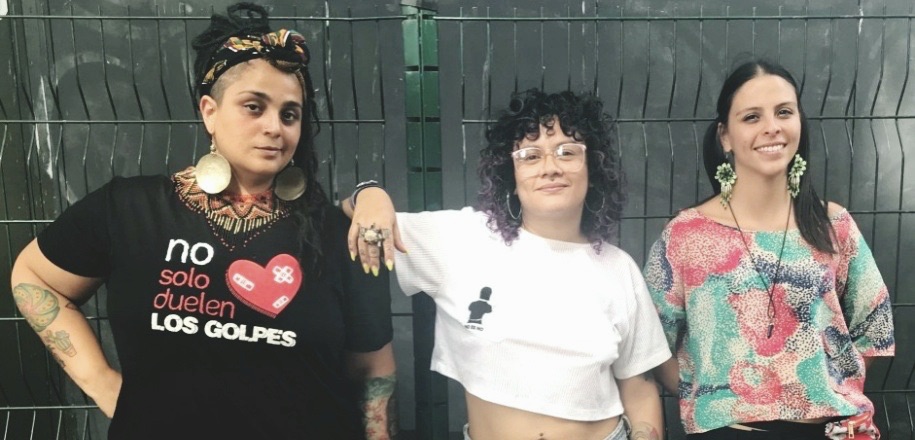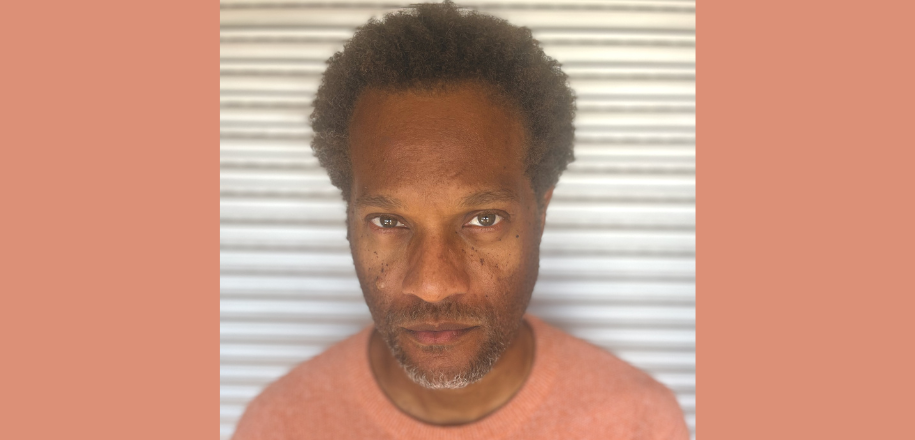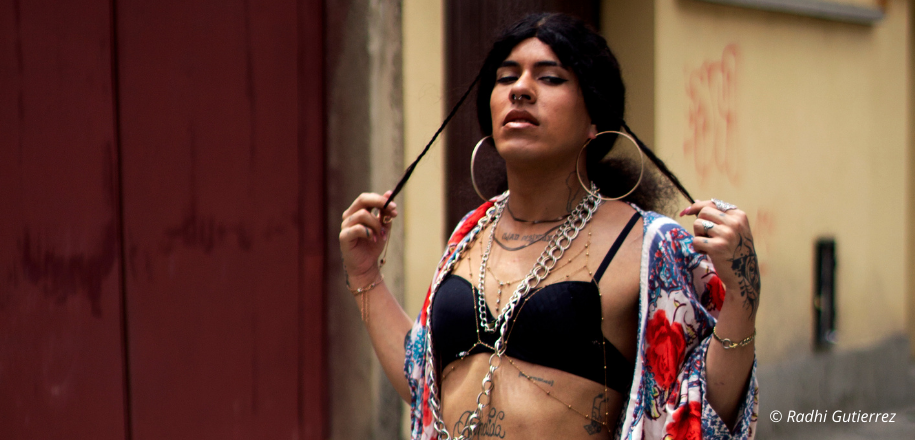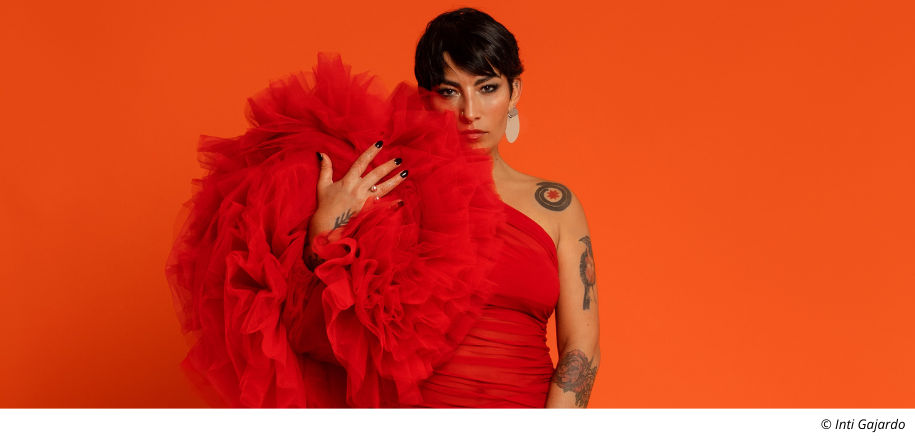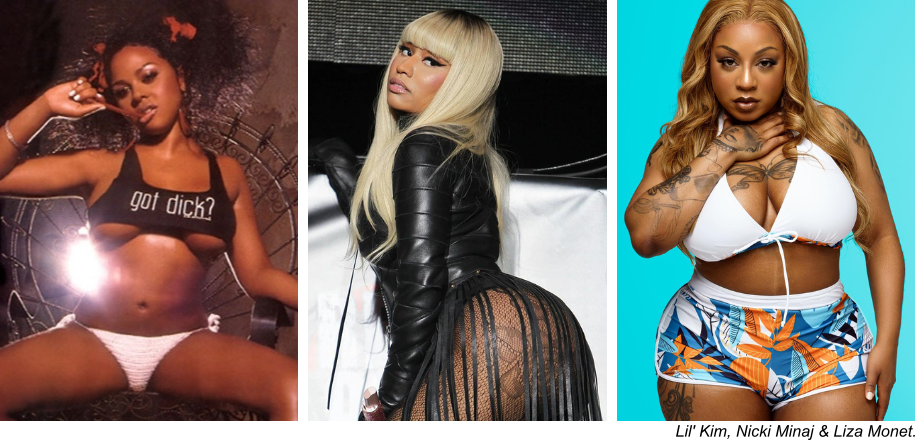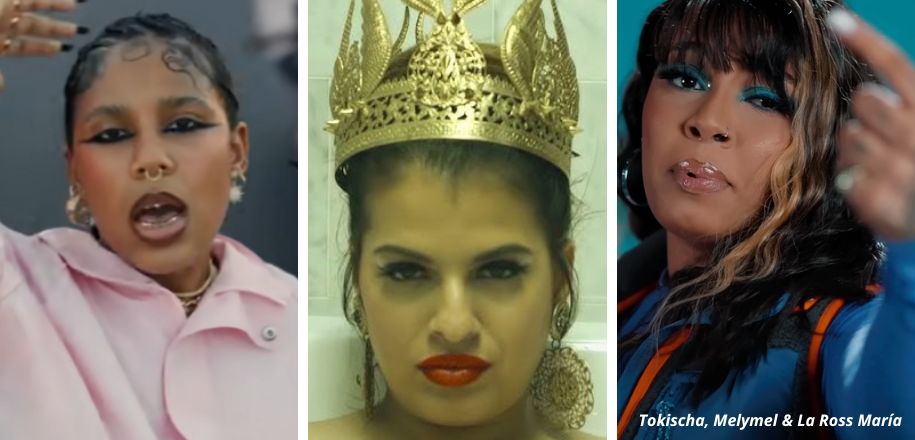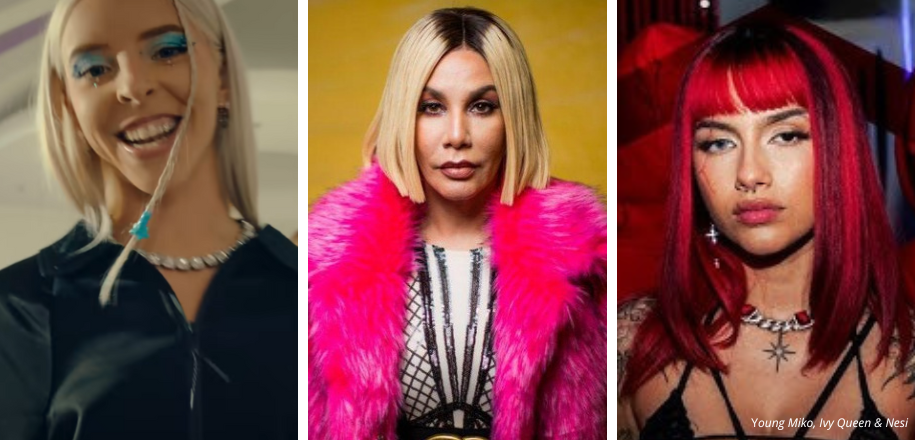For their European tour, feminist rap trio Somos Guerreras made a stop in Paris for two concerts. Before their show tonight at 9PM at Le 6b in Saint-Denis, Nakury (Costa Rica), Rebeca Lane (Guatemala) and Audry Funk (Mexico) told Madame Rap about their collective and solo projects, their views on feminism and what being women in hip hop in Central America means to them.
How and when did you three meet?
Rebeca Lane: I met Nakury in 2013 at a women Festival in Nicaragua called Hall of Femme. We were doing workshops there. We connected because we were both speaking about feminism. In hip hop spaces, feminism was not something usual to talk about, even in spaces that were only for women. This festival was supported by feminist groups, they did all the food, logistics and stuff and hip hop women were taking the lead on everything else. Then, Nakury invited me to her album release party in Costa Rica.
Nakury: There, we recorded a song called Jugando con Palabras. It was the first song we recorded together.
Rebeca Lane: After that, we began to work together. At the time, there were many hip hop festivals and we toured together in Central America and Mexico. That’s where we met Audry. We already knew her because she contacted me for a compilation called Somos mujeres, somos hip hop but we met her in person in 2015.
Audry Funk: When I met them in Mexico, they were planning a tour in Central America. They talked about it in my car and I asked if I could join them. They said like “yeah, why not?!“.
Rebeca Lane: A lot of people in Mexico don’t want to go to Central America. There’s a lot of xenophobia toward Central American people because they believe we only have wars and poor people.
Audry Funk: It’s true. But I thought “why should I not build bridges with my sisters?” We are the same. I feel very connected to them. My father is from Chiapas, it’s almost Central America.
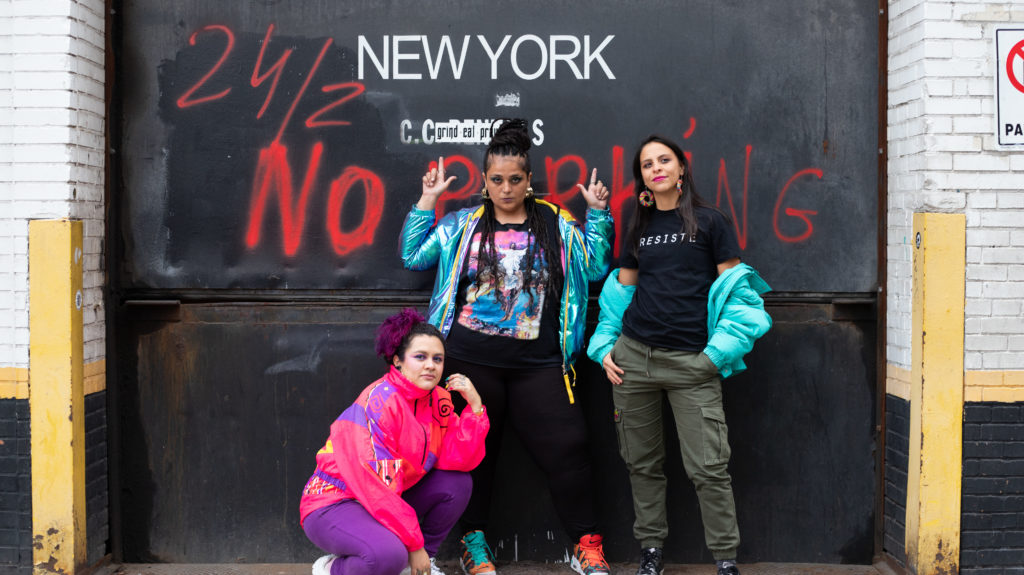
When did you start touring with Somos Guerreras?
Rebeca Lane: In 2016, we started to tour in Panama City, then San Jose, Tegucigalpa in Honduras, Costa Rica, Nicaragua, El Savaldor, from the South to the North. In Guatemala City, we split and Audry went to New York for two years and Nakury and I went to Mexico. It was also a 2-month tour but we were younger!
Nakury: I remember after those two months, we were really exhausted. Our lips were cracked, our hands full of bruises. I was so dehydrated. I came to my country and people were like: “what happened to you?” “A Central American tour!“
Rebeca Lane: After that, Audry could not leave the US because of Trump. For two years, we were in contact through Whatsapp and Nakury and I kept working together. When Audry could travel again, we started a tour in Mexico in November 2018 and in April 2019 in New York.
Audry Funk: This is our first European tour together. We’ve been on tour for a month and a half. After France, we’re going back to Germany for a week of concerts and then it will be over.
Are there many all-female rap bands in Central America? There are very few in Europe…
Audry Funk: There are a lot of girls doing cool things in Central America but there are not as visible as men.
Rebeca Lane: Girls who are doing rap now are very young. I think that when they look at older women like us, they’re inspired to do their own thing. In Central America, we have all-female graffiti, dance and rap crews. There were also some when I started but their position was “I want to be the only one, the only woman“. They were really against other women. It has changed now, but I believe the situation is still different in Mexico, where there are still women who try to hold the spaces they have to themselves.
Audry Funk: I was part of the first female hip hop crew in Mexico called Mujeres Trabajando. Not everyone was feminist. It was the first time I experienced being part of a national female hip hop crew. At the time, I was the only one that wasn’t on stage. It was only men. It was really tough for us women. We had to fight a lot. It was the first step, but now there are more collectives getting together. We have some feminist crews, female rappers… Something is happening.
Why do you think some women want to take all the space/credit?
Rebeca Lane: Hip hop is a pie. Because of patriarchy, women are led to believe that there is only one piece of pie. So as female artists, we think “I’m going to have it“, instead of thinking “why can’t I have half of the cake?” That’s what is feminism in action. You can be a feminist in your mind, read books, but if you don’t take action, nothing is going to happen.
With Somos Guerreras, we started linking the feminist practice with hip hop, saying “we should not be fighting for this one piece of cake, we can work together, and even have our own cake!“
Audry Funk: Our collective is doing something no one in Central America has done before. The media don’t ask us for interviews, because they think we are not big enough but we are doing something different, and it is important to say it.
Rebeca Lane: Right now, in Central America, no male project is as successful as the ones led by women. We have the support of the hip hop community and also of feminist and women groups.
Nakury: As Rebeca was saying, the pie is very little. So there are very little opportunities for many women. It creates a violent scenery. Historically, the people that have been doing events in Central America are women. Because of the patriarchal society, people are used to not appreciate the work of women. It made us also realize who we are working for. Are we going to keep doing our work for men who don’t appreciate us or just for us? That was a very strong motivation for us.
Also, there are a lot of guys who don’t recognize our work and keep boycotting us hardly and intentionally. So the support of people from different parts of the world helped us keeping doing social work in our communities. Some men are supportive, working with us and helping a lot, but it’s not the majority.
Day by day, many guys look at us and think we’re breaking the system that’s fucking up everyone, even them. They realize it and change their patriarchal behavior.
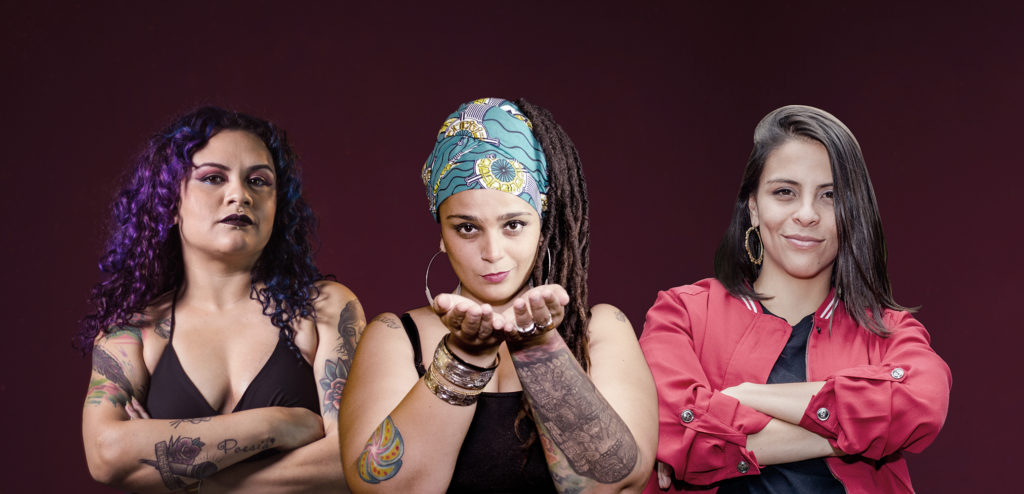
Do you feel you’re doing politics and activism besides rap?
Audry Funk: For me, just the fact that we are doing music in this old world and industry of men is activism. It is innovative and we’re breaking barriers. It is a political act.
Rebeca Lane: We are also active outside of music, each one in our own context. We’re doing feminist activism, environmental activism, territorial activism, antiracist, decolonial and migrant activism…
Nakury: In the events we organize, we are addressing the issues happening inside our communities. For example, in Costa Rica, the waacking dance community has been doing a great job, addressing all the issues of LGBTQ communities. We support their events and back them up in case something happens. We want to make sure the events are inclusive and leave the society prejudices behind by defending the rights of all people.
How would you define your feminism? Is there a feminist current you most relate to?
Audry Funk: Intersectional, decolonial and communitarian feminism.
Rebeca Lane: I don’t say I am a communitarian feminist because I don’t live in the same conditions as women who claim it but for me, there are my teachers. I learned a lot from them. This feminism was born inside the indigenous territories in Guatemala, Bolivia and Ecuador and means unifying the struggles for land with the struggles for women’s rights. It is anticapitalistic and anticolonial. For Western and white feminism, the only category of oppression is women. But there are other categories of oppressions, like class, racial and colonial oppression, that we now understand thanks to Black feminists who talked about intersectionality.
Nakury: Intersectional, decolonial and communitarian feminism. I come from a rural community where most my family lives, and women there are fighting against domestic violence and child abuse. Through the ancestral knowledge that we are all connected to nature, they teach us that we have a common sense. If you want to have equal rights for everybody, you have to fight all the oppressions. I think it’s time Europe has looked at these territories and learned from them.
What have you learned from working and touring together with this project?
Audry Funk: I learned how powerful it can be to unite with powerful women instead of being in competition. It taught me to understand other realities, my sisters and why they have historical traumas in their body (because everybody who comes from a colonized country has one).
Besides, I don’t feel alone anymore. There are a lot of women doing things and fighting for the same things. Sometimes you feel alone, but it’s not true. It’s important to know that because you can create collectives.
Nakury: Working with a team requires a lot of cooperation, respect and tolerance. It’s hard but it’s also very satisfying. I see them like my sisters, they teach me a lot because they are older and have more experience.
Rebeca Lane: Touring in the First World made me become aware of my privileges. For example, in Guatemala, I am a mestiza woman so I have never been subject of discrimination. But when I went to the First World, I realized I was a woman of color. It made me realize how I reproduce racism toward indigenous or Afro-descendant women in my own country and how I benefit from this structural racism. Coming here, I see how Europe is getting benefit from our oppression because we come from colonized countries. It’s one of the hardest lesson to learn.
When we come to France and see this peaceful environment, women walking on the streets and feeling safe, trains going up until midnight and people not being afraid of taking one of them, we realize how hard it is for us to live in the conditions we live in and how unequal the world is. We should all be experiencing this. The peace they have here is because of the wars we have in our territories.
It has also taught me to listen to migrant people. In Europe, people think they show solidarity going to Africa or to Latin American and posting pictures of the interesting things they do there, whereas here, there are people from African, Latin American and Arab countries fleeing the war. You don’t have to fly all the way to another part of the world to post these exotic photos when you can do something here for people suffering from colonialism.
In our countries, many people are not aware of it. Because we live in a small bubble and think our problems are the only ones in the world.
What are your upcoming projects?
Rebeca Lane: After this tour, we will go back to our solo projects. For 2020, we want to reactivate the process of the documentary we started in 2016. It has been difficult for us to keep our individual career, Somos Guerreras and work on the documentary. We want to do another tour with dignifying conditions to do a dignifying documentary about women in Central America.
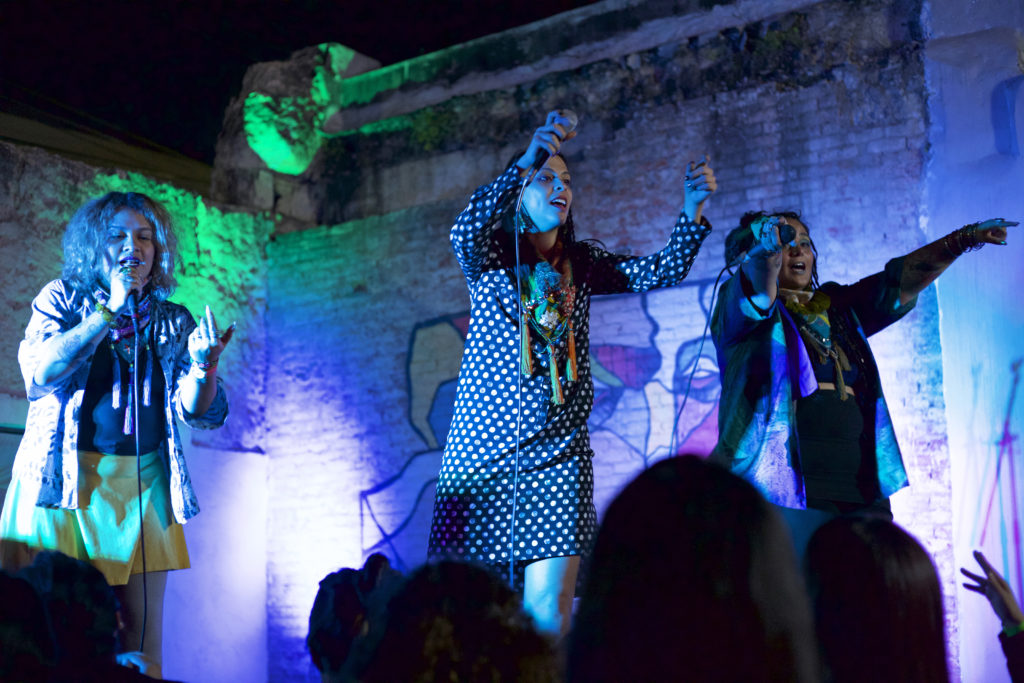
What do you wish for today? What are your needs as artists and people?
Audry Funk: Pay the bills. Have a decent life and make money through my art. I don’t ask for millions but I just need to pay the rent and be able to pay for my projects because I am an independent artist. I just want to have the right amount of money to do the right things. Art is a job, you need to be paid for it.
I also want to do more tours, have a new CD, meet more people and connect with more femcees and female artists.
Nakury: I’m going to release an album at the end of the year that speaks about community connections and do some workshops with my record label Lácteo Cósmico. We are going to work with women of the hip hop community to help them professionalize, help them understand royalties, how to make press kits, organize and event, how to make a song, master the technique, the sound system…
Also, I’m planning to write and direct the video clips of my album. It is very challenging for me because for a long time, I’ve been looking for help from other people, mostly men. Every time I worked with men, they wanted to change everything: the script, the actors… So I’m going to make a project full of women! I used to be scared of it but now I’m feeling very happy and empowered because I’ve realized it is the only way to do it.
Rebeca Lane: I want to rest! I’ve been touring non-stop since 2015. I’m exhausted and really wish to understand my own needs. Then I’ll work on a new album. When you come from a working-class background, you learn that you need to work all the time and take all opportunities because you don’t know if you’re going to have another one tomorrow. I need to work on this and would like to learn to have a balance. So for the beginning of next year, I might rest!
- Find Somos Guerreras on Facebook, Instagram, Twitter, Soundcloud, YouTube and Spotify.
- Find Rebeca Lane on Facebook, Instagram, Twitter, Soundcloud and YouTube.
- Find Nakury on Facebook, Instagram, Twitter, Soundcloud and YouTube.
- Find Audry Funk on Facebook, Instagram, Twitter, Soundcloud and YouTube.

